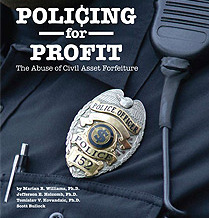The government first created the asset forfeiture program in the early 1980’s to combat drug cartels and other large drug kingpins in its famed “War on Drugs.” The initial policy started with the intention of taking away the profit motive inherent in large drug enterprises in addition to prison. After all, if you spend maybe 2, 5, heck even 10 years in prison and come out the other side with your financial gains still available to you, the risk may be worth the reward. Make the money disappear and now the crime doesn’t look as appealing if you come out broke.
The plan
The idea was simple; seize the money of large-scale drug traffickers and dealers to destroy the financial incentive associated with such criminal enterprises. Take out the financial rewards of the business and you eliminate the trade itself, or at a minimum hit them where it hurts most, economically. If you make it so that the risk-reward was to high then you eliminate those willing to get involved in the first place.
What went wrong?
The seizure laws expanded to not just taking money but all property associated with drug activity. In addition to criminal asset forfeiture the federal government started to use civil asset forfeiture to seize property that they claimed were related to drug crimes. This no longer limited the seizure to drug king pins but now allowed the government to target the low-level users and dealers. Furthermore, civil asset forfeiture did not require a hearing where the asset take had to be shown linked to the drug crime (after all, it’s hard to take a person’s vehicle if they have merely 1 gram or less of marijuana on their person) A significant departure from the policy’s intended purpose and scope.
Then the States themselves started to create their own forfeiture laws and this is where the problem escalated. Why you may ask? An example is the asset forfeiture law here in South Carolina. When you look at South Carolina’s drug forfeiture laws, you will notice that law enforcement and prosecutors to fund their own departments use the property seized. With both federal and state governments in debt crisis over their own budget shortfalls these agencies found another way to get cash, and lots of it, without having to get it from government grants.
Clowns, coffee maker, margarita mixer…
If you thought that police were taking your property and using the money for legitimate equipment for law enforcement then I guess that depends on what your definition is legitimate equipment is. If it covers clowns, high priced coffee makers, margarita machines, beer etc. then you will feel good about what’s taking place. For the rest of us you might be thinking surely they cannot be so reckless. Wrong. This article in Russia Today highlights the problem and the spending habits of police such as hiring a clown for $225 (The money I spent on Sparkles the Clown is a very, very minute portion of the forfeited money that I spend in fighting the war on drugs,” he told The Post.), a coffee maker for $637, throw in a $5 million helicopter.
No due process
It gets worse. You don’t even need to be charged with a crime to have your property seized. Let that sink in for a moment. I didn’t say convicted; I said arrested. Law enforcement can take your property without even placing you under arrest. To fight for your property and attempt to get it back the burden of proof is on you, not the government. You have to show the court that the property seized was not the product of illegal acts.
Police do not need to get a search warrant before seizing the property and you don’t have to be charged with a crime. Law enforcement does not even have to meet the minimal standard of probable cause to take your stuff. This goes against every principle that a free society should be protected from an overbearing government and yet it goes on and our government is proud of how they act and what they do with the proceeds from the fruits of their gains. Watch this video for a comical but unfortunately the current state of affairs regarding this practice. Read more about asset forfeiture from the Washington Post’s series.
Solution
I don’t think that going to your legislature will stop this on their own. The reason being that law enforcement and prosecuting agencies seek out their local legislators to get funding for their expenditures such as additional staff, equipment, etc. However, through asset forfeiture there is no obligation to report the property they seize and they do not need to file the paperwork to request funds that the asset forfeiture proceeds are buying, it’s a win-win for both sides. Legislators do not have say no to additional funds and risk facing unpopular opinions come re-election, so there’s no incentive for either side to change the process unless it comes from the citizens themselves. So it will be up to the people to right this wrong and more importantly, it will need enough people to get involved so that legislators will know that their re-election will be at stake if they refuse to listen to those they serve.
Criminal Defense Lawyer Charleston, SC
If you have been a victim of criminal asset forfeiture and want to fight to get your property back call an experienced and trusted Charleston criminal defense lawyer at Dale Savage Law Firm for a free consultation today at (843) 530-7813.

